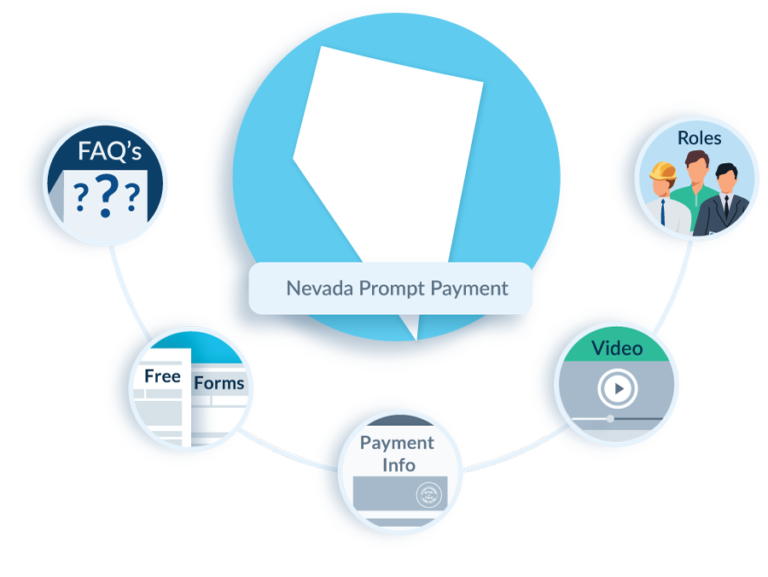Nevada Prompt Payment Requirements
- Private Jobs
- Public Jobs
Prime Contractors
Prime Contractors in Nevada are entitled to progress payments within 21 days after invoice. The owner must make final payment within 30 days after completion of project (project available for intended use). These deadlines can be modified by contract.
Subcontractors
For subcontractors in Nevada, payment on a private construction project is due by the earlier of 10 days after the hiring party receives payment, or the date that the payment due under the contract.
Suppliers
For Nevada suppliers on a private project, payment is due by the earlier of 10 days after payment is received by the hiring party, or by the date payment is due under the contract.
Interest & Fees
Nevada's prompt payment laws allow an interest penalty at either the statutory rate or the contract rate, whichever is higher. Attorneys' fees may be awarded to prevailing party, but require the prevailing party to have exercised their right to suspend and terminate.
Prime Contractors
On public projects in Nevada, progress payments are due to Prime Contractors within 30 days of invoicing. The final payment and retainage payments are due within 30 days of either occupancy, use, or notice of completion, whichever is earlier.
Subcontractors
On public projects in Nevada, subcontractors are entitled to payment within 10 days of payment receipt by their hiring party.
Suppliers
Suppliers on public Nevada projects must receive payment within 10 days after their hiring party receives payment.
Interest & Fees
If payment is late on a public project in Nevada, the unpaid party may charge interest at the statutory rate; a penalty of 1% month. Attorney fees may be awarded to the "substantially" prevailing party in a prompt payment claim.
Nevada’s prompt payment laws set a deadline for payments to occur on both public and private construction projects. Prompt payment laws are a set of rules that set an acceptable amount of time for payments to contractors and subs. This is to ensure that everyone on a construction project is paid in a timely fashion. Nevada’s prompt payment statutes provide a framework for the timing of payments to ensure cash flow and working capital.
Projects Covered by Prompt Payment in Nevada
The prompt payment provisions in Nevada are split into two sections, covering both private and public projects. These statutes govern the timing of all payments on construction projects, and impose penalties for late payment in the form of interest.
Read more on our blog: Using Prompt Payment to Get Paid Faster in Nevada
Private Projects
Payments on all private construction projects within the state of Nevada are regulated by Nev. Rev. Stat. §624.606 et seq. Nevada’s prompt payment laws for private projects set a deadline for payments on all tiers of a project. This includes payments from the property owner to the prime contractor; from the prime to subcontractors; and from subcontractors to their subs and suppliers.
Payment Deadlines for Private Projects
Nevada’s prompt payment deadline for property owners to pay their prime contractor depends on what type of payment is being made.
Progress payments must be made in accordance with the contract terms. If the contract does not contain a provision for payment timing, then Nevada requires the property owner to make progress payments to the prime contractor within 21 days after receipt of a proper request for payment.
As for final payments, the owner must make payment within 30 days after the occupancy or use of the property, or the date the improvement is available for its intended use. For the second to apply, the contractor must have either provided a written notice of availability, or a certificate of occupancy was issued on the improvement.
On a private project in Nevada, payments to subcontractors must take place within 10 days after the prime received payment from the owner, or according to the contract payment schedule; whichever is earlier.
If there is no payment schedule set forth in the contract, payment must be made either 30 days after the receipt of a request for payment or 10 days after the prime received payment; whichever is earlier. These same provisions apply to all other payments down the payment chain.
Penalties for Late Payment on Private Projects
According to Nevada’s statute, interest on late payments will accrue at the rate of 4% plus the contract rate, or the prime rate at the largest bank in Nevada (determined by the NV Dept. of Business & Industry); whichever is higher.
Public Projects
Nevada’s prompt payment laws for public works projects are found in Nev. Rev. Stat. §§338.400 to 338.645. On public projects, payments are regulated at every tier of a project. This includes from the public agency to the prime contractor, from the prime to their subcontractors, and so on.
Payment Deadlines for Public Projects
Nevada law states that progress payments from the public agency are due to the prime contractor within 30 days of the agency’s receipt of a request for payment.
Final payments to the prime contractor are due within 30 days of occupancy, use, or notice of completion of the project; whichever is earlier.
Once the prime contractor receives payment, they must pay their subcontractors or suppliers within 10 days. The same 10-day deadline applies to all other payments down the line on the project.
Penalties for Late Payment on Public Projects
If payment is late on a public project, Nevada entitles prime contractors to interest at a rate “equal to that quoted by at least 3 financial institutions in Nevada as the highest rate paid on a 90-day Certificate of Deposit.”
Nevada’s prompt payment interest penalty for all other late payments accrues at a rate equal to the lowest daily prime rate plus 2%.
In addition to an interest penalty, attorney fees may be awarded to the substantially prevailing party in a prompt payment claim.

